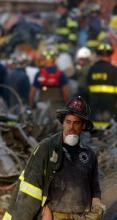In the months and years since the attacks of Sept. 11, 2001, the questions have not stopped and the answers have not always been forthcoming. What exactly were the physical and mental effects on those who survived the attacks? What about those who were first responders? Or volunteers who helped clear rubble at the World Trade Center site?
And what has been the impact on people whose family, friends, or co-workers perished on that day in New York, at the Pentagon or in Shanksville, Pa.?
On Thursday, Sept. 8, a few days shy of the 10th anniversary of yet another day that will live in infamy, the federal government announced that it was appointing a panel of experts to help advise the WTC Health Program on these issues.
It’s not that they were going entirely unaddressed, but there has been a hodgepodge of efforts, not all of them well-funded or comprehensive. Will this new program with its new slate of scientific advisers be able to provide better answers? Only time will tell.
The WTC Health Program came into existence in July, thanks to the James Zadroga 9/11 Health and Compensation Act of 2010. Named after a police detective who worked at Ground Zero and later died from a respiratory illness in 2006, the bill barely made it into law.
This New York Times article explains some of the back story–Senate Republicans worried that the U.S. would not be able to afford the law’s estimated $7.4 billion cost. That included $3.2 billion over the next 8 years to monitor and treat anyone who worked at the WTC site, and $4.2 billion to the September 11th Victim Compensation Fund.
The Times said that some 60,000 people had already participated in the World Trade Center (WTC) Medical Monitoring and Treatment Program (MMTP). That program was primarily available to response and recovery workers at the WTC site.
The city of New York has been actively monitoring and treating 9-11 survivors. It maintains a detailed list of possible health effects. And most of the MMTP sites were in New York.
The new law goes further, reaching out to others who were at the Pentagon and in Shanksville, and also to residents and workers who were in buildings close to the Twin Towers that day and in the days afterward. The Zadroga Act also puts a higher premium on research and epidemiology.
The 15-member World Trade Center Health Program’s Scientific/Technical Advisory Committee will help shape the research agenda and determine whether more health conditions need to be included in the monitoring and treatment rubric. The panel includes toxicologists, occupational physicians, a pulmonologist, experts in environmental health, a psychiatrist, and two representatives of WTC responders.
The program’s administrator, John Howard, said in the announcement that, “Independent expert scientific advice from the panel will be essential when complex scientific questions arise, and this panel represents the best of the field.”
Howard came under fire in late July when he announced the decision that the program would not pay for cancer-related expenses. That decision may be one of the first to be reviewed by the panel, which will begin meeting in New York in the fall. The advisory committee’s recommendations are just that, apparently. As of now, the program’s administrator has discretion to follow or ignore the panel’s advice.
Once the public meetings begin, the proceedings and recommendations will be available on the WTC Health Program website.
—Alicia Ault (on Twitter @aliciaault)


